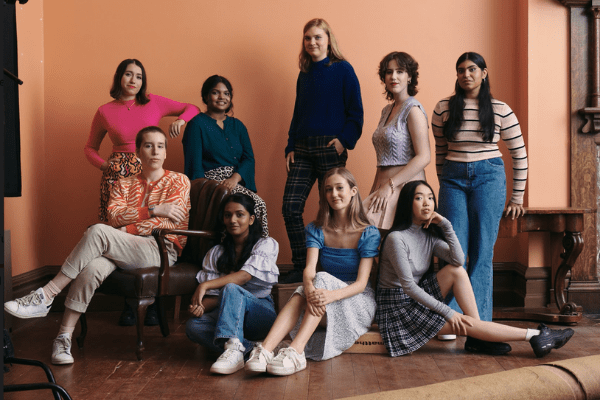Enforce stricter quotas, nurture girls’ leadership ambitions and appoin women and people of diverse genders and identities to committees or boardrooms. Those are just a few of the recommendations made by Australia’s next generation of change-makers.
Launched last week within a Plan International Australia survey, the recommendations aim to remove sexism and misogyny from political leadership, and were drafted by this year’s Youth Activist Series – nine young people from Melbourne and Sydney, aged between 16 and 24 who have demonstrated a passion for equality, human rights and the environment.
Plan, the Melbourne-based charity for girls’ equality has partnered with The Body Shop to amplify young people’s voices on equality through delivering seminars on activism and leadership skills, advocacy, campaigning, media, public speaking, and collective action.
The new program comes after new polling data of girls’ leadership aspirations revealed most Australian young women do not believe the culture in Parliament House is safe for women, and would like Australian men to do better in calling out sexism.
The polling was conducted by YouGov with a politically representative national online sample of over 500 women aged 18-25 in Melbourne and Sydney last month.
The nine activists drafted a series recommendations on ways to improve the culture in parliament in response to the spate of reports of sexual misconduct, alleged rape, and women being victim-blamed, talked over and side-lined in our national parliament.
Here they are in full: (source: Plan Australia)
- Implement policy to ensure that Parliament – and all workplaces, schools and higher education institutions – is a safe and equal space for all women and one free from misogyny and sexual harassment.
- Political parties must act urgently to enforce stricter quotas – not just for women, but for all people of different sexualities, genders, ethnicities and backgrounds who represent the diversity of the country we live in.
- Governments need to nurture girls’ leadership ambitions and give them a seat at the decision- making table through investing in emerging leadership programs in Australian high schools and providing networks and mentorships to girls to become leaders across government, business and civic life.
- Standing in solidarity with girls and young women who report sexual harassment and abuse, and ensuring there is an independent and confidential avenue for girls and women to report such incidents
- Ensure no one is forced to choose between leadership and family life, and presenting clear pathways for young women to enter the political sphere
- The appointment of women and people of diverse genders and identities to committees or boardrooms must go beyond mere tokenism – they must be respected and given equal power to their male counterparts.
- Creating educational and learning environments for all genders around the meaning of consent, both within Parliament and our educational systems.
16 year old high school student, Harleen, believes these recommendations are necessary for future change.
“It is essential for our politicians to gain an understanding of the difficulties that women and gender diverse people face in their lives that transpires into politics,” she said in a statement.
“As leaders, they must put forth affirmative action that will tackle issues of sexism and misogyny, and question their own values when it comes to inclusivity in politics.”
Other YAS participants include a non-binary arts / science student from Sydney, an environmental engineering activist, a queer mental health advocate from regional NSW and a Greek-Australian artist and activist, who mainly works in theatre and film as a director, actor and writer.
Susanne Legena, CEO of Plan International Australia, agrees that the latest studies on women’s views about politics is troubling and that these recommendations are a positive step forward for creating change.
“The fact that this polling shows that only one in ten young women believe the work culture in our nation’s capital is safe for women in a shocking indictment on our country,” she said.
“Girls should be growing up believing anything is possible, not being forced to choose between their leadership aspirations or their own safety.”
“The impact is particularly worrying for girls in their teenage years, when they’re forming lasting perceptions about the world and their own role within it. They witness women being treated unfairly or subjected to abuse, and the message they hear is that politics isn’t a safe place for them.”
“What this new data and now, these powerful recommendations from our youth activists, show is that rather than dealing with the toxic culture in parliament, the situation is only getting worse.”
“Young women in particular know that everyone deserves the right to live and work in an environment free from harassment and violence, and they are telling us loud and clear that enough is enough.”
“These extraordinary young activists may be young, but they have an unwavering passion for gender justice and equality,” Legena added. “They have told us that change is too slow. They seek solidarity and action with others to bring about the changes that will empower all young women to fulfil their potential.”
The Body Shop plans to support the program by donating $80,000 this year.


